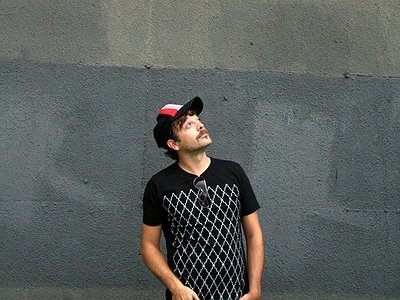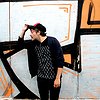Part 2
Could you take us through a day in your life, from a possible morning routine through to your work? Do you have a fixed schedule? How do music and other aspects of your life feed back into each other - do you separate them or instead try to make them blend seamlessly?
A cup of coffee and a few cigarettes is what I need to open both eyes in the morning. This is a good time for emailing and social media. Then it will usually be studio time. In the studio there is no Internet access and this is very important. I can take a call and a message and I am never completely shut off but I am well aware of how constant Internet access can eat up your time and energy. There will be a lunch break and a second coffee if necessary. Then back to work if there are projects I am working on. If there is a meeting, work can be postponed for later. Tea is my drinking companion through out the studio time. There are always unpredictable elements in my life but if there is a pattern, that would be the one. There are times where I may not really work much in the studio. I now identify these periods of vanity and emptiness. Some times it is internal processing or some personal issues. Then I will organise files, back up data, look into old projects, or take some time off - if possible.
Could you describe your creative process on the basis of a piece or album that's particularly dear to you, please? Where did the ideas come from, how were they transformed in your mind, what did you start with and how do you refine these beginnings into the finished work of art?
My one and only album was released in 2013 on Moon Harbour. The title was “No School” and it described my approach to music as described above. Something between old School and new School, between analogue and digital, retro and modern. Both and none. Open to old techniques (tape delays, old mixing desks etc.) but also following up technological developments. (Software, computers etc.)
It started out with a few collaborations and some strong ideas that would make no sense as a 12” release as the music was more subtle and home listening yet worth-releasing. It had been a period of 3 years of preparation, pre-production, recording sessions, mixing, post-production, cover design and a few more tasks. It was a full time assignment actually.
There are many descriptions of the ideal state of mind for being creative. What is it like for you? What supports this ideal state of mind and what are distractions? Are there strategies to enter into this state more easily?
Lately people are talking about healthier ways. Eating especially but also meditating etc. For me music is a sort of meditation too. It is primarily the way I communicate emotions untold, firstly within my self. If something develops into a finished piece of music and gets released, this may mean that other people could identify with this feeling / emotion / aesthetic, or they may have just liked it. The first part is the most vital and important for me. The relationship that you develop with your music and how you use your tools to communicate feelings / emotions / ideas.
Music is a vehicle to communication. Communication is art. There are plenty of distractions and they are mainly used to shift the weight from the main question, which is always: WHO AM I?
How is playing live and writing music in the studio connected? What do you achieve and draw from each experience personally? How do you see the relationship between improvisation and composition in this regard?
Everything is connected. What you may play live is a part of what you do in the studio. The tools are different, the energy and intensity are different too. With electronic music most of the live sets are pre-programmed as it is hard to emulate the studio complexity into a live environment, but there should always be moving elements and improvised bits in my opinion. This can work both ways as something that you may try live for the first time (by accident?) can later find its way into the studio, thus reversing the creative process.
How do you see the relationship between the 'sound' aspects of music and the 'composition' aspects? How do you work with sound and timbre to meet certain production ideas and in which way can certain sounds already take on compositional qualities?
The music style you produce may define that. When a production is minimalistic, the sound aspect becomes very important. The same applies when the music is experienced in a listening environment (Hi-Fi, Headphones, car). The Sound aspect becomes more of a balancing technique when working on more complex or pluralistic projects (more channels, frequencies involved) The live environment is almost always compromised as there are a lot of variables involved, Space and architecture, sound system and reflections, background noise etc.
Composition is very important in both cases and maybe in a live environment elements may appear shorter or longer depending of the setting and time capsule a crowd is into. As for the studio environment, composition and editorial choices are very important and take up a lot of my time.
Our sense of hearing shares intriguing connections to other senses. From your experience, what are some of the most inspiring overlaps between different senses - and what do they tell us about the way our senses work? What happens to sound at its outermost borders?
As I said earlier, sound is still a bit unexplored. Our strongest sense is smelling and the most exploited is vision. The whole magic is that you only know what you are experiencing and what a song or a sound means to you. Beauty lies in the ear of the beholder (laughs). Of course it talks deep to survival instincts too, like identifying with a music style or the sense of belonging somewhere (folk music). So it all depends what people do with music or what use they have for it …. Some people like to explore new sounds (experimental) while others prefer the recreation and repetition of publicly accepted sonic motives or scales (classical music).
Art can be a purpose in its own right, but it can also directly feed back into everyday life, take on a social and political role and lead to more engagement. Can you describe your approach to art and being an artist?
Joseph Beuys said, “Every man and every woman is an artist”. A few decades earlier Alistair Crowley had said a similar thing: “Every man and every woman is a star”.
I believe both to be true and it does draw a reference to what I said earlier about the meditating purposes of music. Art is communication and if you use music to communicate with your inner self, this is art. In this sense, every one should communicate with themselves, thus everyone should be an artist. What Crowley and Beuys said also had a social and political message. The message was: Free your self from superstition and prejudice. Create freely and through this process you will discover your self and be a happier person.
It is remarkable, in a way, that we have arrived in the 21st century with the basic concept of music still intact. Do you have a vision of music, an idea of what music could be beyond its current form?
Classical music was created to reflect the mathematics of our three-dimensional world and seems to have been conceived with that in mind.
It set the standards for musicians worldwide to communicate, thus it was a new language. The way we live has changed drastically since then and our language has changed too. The way we communicate and experience music has changed but the emotions and purpose of music is effectively the same. We may develop new sounds and styles to communicate, but the subject matter has been pre-defined since centuries. Maybe in the future we will develop the exact frequencies that generate a feeling or project a desired emotional state. I doubt it, as there is no money profit in it, but that could be an interesting development.






